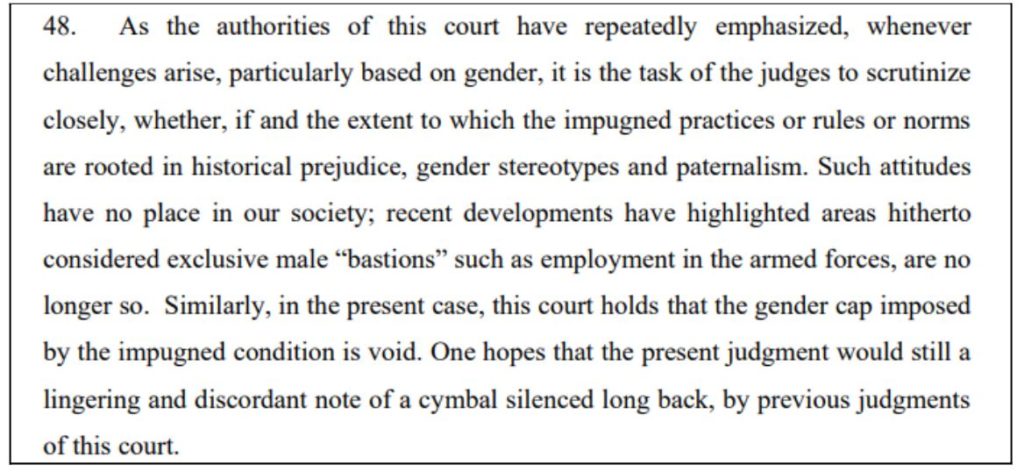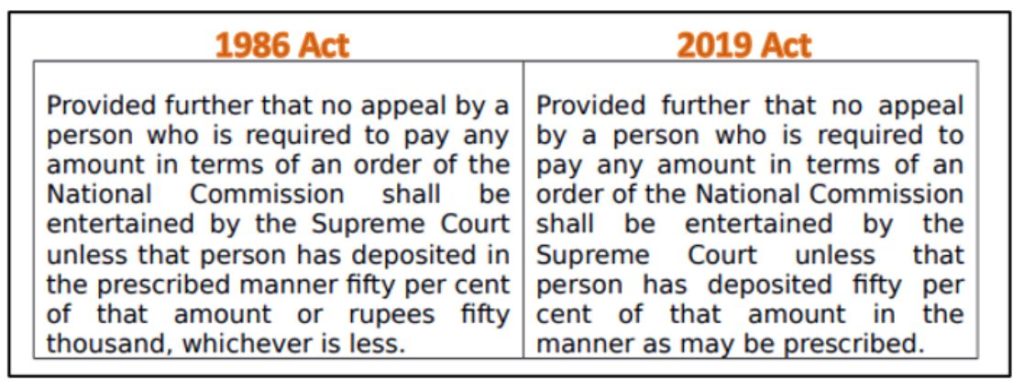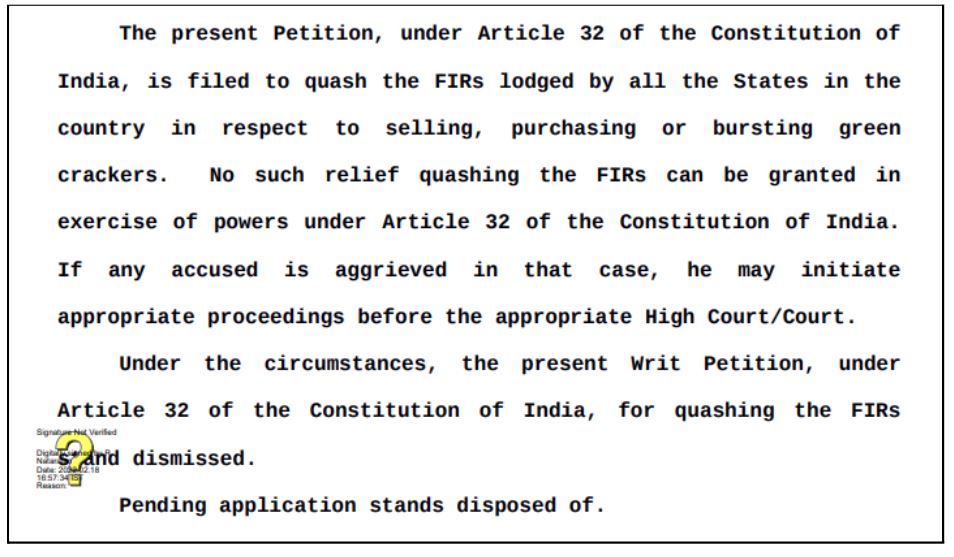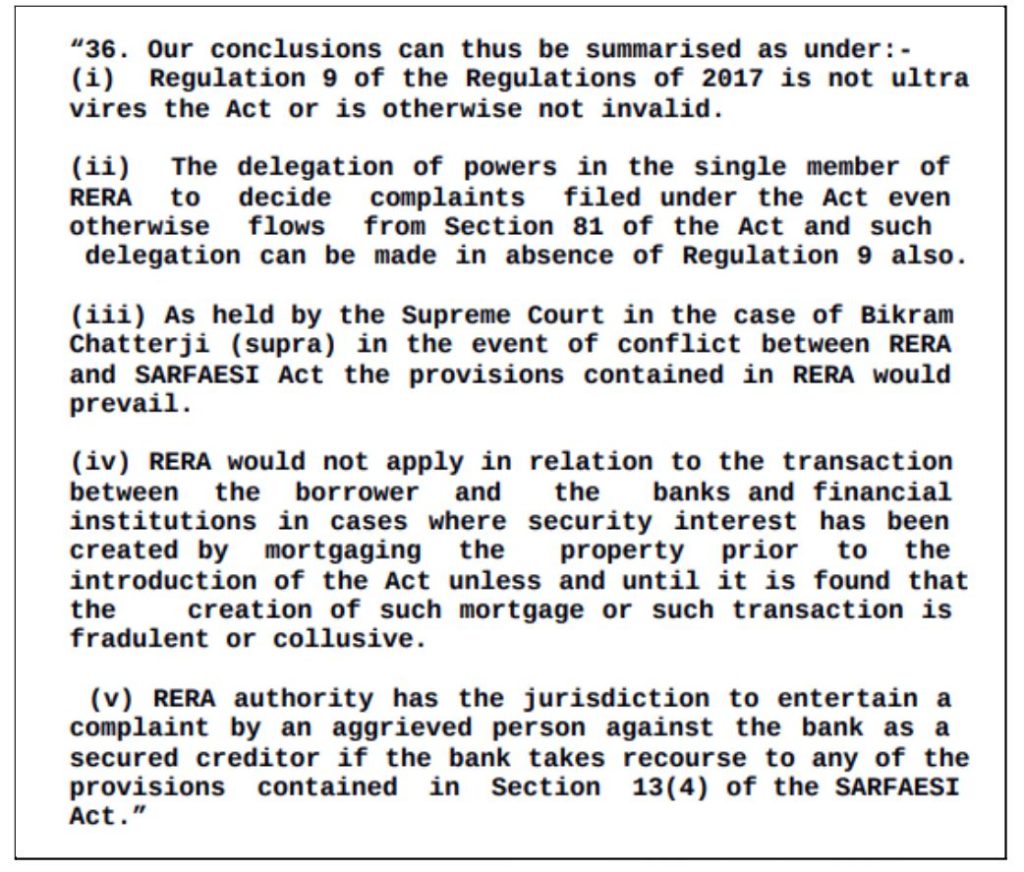In this roundup of Court Judgements, we look at the Supreme Court’s observations & directions about how the State should provide a safe atmosphere for women to work, and not restrict them from doing so, about how prior criminal history, conduct, and behaviour in jail, and possible danger to society of convict should be considered for premature release, that appeal against NCDRC’s order in the SC prior to commencement of 2019 Consumer Act does not require 50% pre-deposit, and that provisions under RERA would prevail over that of SARFAESI in case of conflict between the two.
SC: The state should provide a safe atmosphere for women to work, and not restrict them from doing so
In Hotel Priya, A Proprietorship vs. State Of Maharashtra, the appellants either owned or operated restaurants or bars where orchestra performances are common (referred to as Orchestra bars). Earlier, they had challenged certain conditions imposed by the Commissioner of Police, Brihan Mumbai, under Licensing and Performance for Public Amusement including Cabaret Performance, Melas and Tamashas Rule, 1960 framed under the Maharashtra Police Act, 1951 before the High Court of Bombay including the cap on the number of artists that can perform and the number of women artists on stage. As per the conditions,
- The licensee is permitted to keep only four women singers/artists and four male singers/artists to remain present on the permitted stage.
- Only eight artists are permitted to remain present on the permitted stage (four male and four women).
The appellants had claimed that the conditions were a violation of Article 14 and Article 19(1)(g) of the Constitution of India that guarantees equality before the law and entitles every individual to practice any profession. However, the High Court rejected the petition stating that the Commissioner had acted well within the power to do so.
The appellants stated that there was no rationale behind the numerical division of equal gender participation in the orchestra band since the performance would depend on the band/group and what they wish to perform. Further, this division does not allow the participation of transgender persons.
Not convinced with the State’s justification that such restrictions were necessary for the public interest to promote the welfare of women, prevent human trafficking in women, and their exploitation, the bench of justices KM Joseph and S Ravindra Bhat stated that the State should provide a conducive environment for women to work in, and not restrict them from working. It stated that the order seemed to be the product of a stereotypical view that women who perform in bars and establishments, like the appellants, belong to a certain class of society and the cap directly transgressed the fundamental rights of the performers as well as the license owners.
The Bench nullified the order and allowed the appeal stating that “the condition imposing a gender cap as to the number of women or men, who can perform in orchestras and bands, in bars licensed under the Rules, 1960 and other allied provisions, is void. While the overall limit of performers in any given performance cannot exceed eight, the composition (i.e., all-female, majority female or male, or vice versa) can be of any combination.”

SC: Prior criminal history, conduct and behaviour in jail, and possible danger to society of convict should be considered for premature release
In Sharafat Ali vs. State of UP & Anr, the petitioner was convicted for murder and sentenced to life imprisonment in 2005. After undergoing imprisonment for 17 years, 9 months and 26 days, he applied for premature release. However, his application was rejected by the State government taking into consideration the records of the District Magistrate and Superintendent of Police which stated that the possibility of resentment on the victim’s side cannot be ruled out if he is released prematurely. Also, the order stated that the petitioner had an “extremist nature” and there was possibility of him committing an offence again.
The Supreme Court bench of Justices DY Chandrachud, Surya Kant and Vikram Nath observed that the order passed by the State government contained only general observations such as resentment of the victim’s side which is general to all offences of murder. It did not contain anything specific to the petitioner, as to whether he possessed any other criminal history, his conduct and behaviour in jail which would give a picture on whether he would pose a danger to society if released.
Noting this, the Supreme Court Bench set aside the State’s order and called for reconsideration of the petitioner’s application for premature release, as per the policy in 2005 when he was convicted. The Bench added that the application must be considered fresh, and the order must consider relevant facts and circumstances such as the convict’s prior criminal history, conduct, and behaviour in jail after being convicted, possible danger to society, etc. The Court also set a deadline of two months from the date of the verdict, for completion of the exercise.

SC: Appeal against NCDRC’s order in the SC prior to commencement of 2019 Consumer Act does not require 50% pre-deposit
In ECGC Limited vs. Mokul Shriram EPC JV, the appellants approached the Apex Court against an order passed by the National Consumer Dispute Redressal Commission (NCDRC) which directed them to pay over Rs. 265 crores along with interest. The complainant was given a contract to construct rainwater drainage, sewerage, and municipal road system by the Government of Basra, Iraq. The complainant obtained two specific contracts (Letter of Credit Comprehensive Risks Policies) by paying a sum of Rs. 10,38,03,912 as a premium to the appellant. The grievance of the complainant was that the payment for invoices issued for the work done under the contract was suspended. Later, the contract also was withdrawn by the Government of Basra owing to some internal conflict. The appellant had rejected the insurance claim of the complainant and thus relief was sought before the NCDRC. The NCDRC allowed the complaint only in January 2021.
The issue raised before the Supreme Court was if the appeal before it would fall under the Consumer Protection Act, 2019, or under the erstwhile Consumer Protection Act, 1986. Under the 1986 Act, no appeal against the NCDRC’s should be entertained by the Supreme Court unless the person who is required to pay the amount deposits 50% of the amount of Rs. 50,000 whichever is less. The provisions of the 2019 Act state that no appeal should be entertained by the Apex Court unless the person deposits 50% of the amount required to be paid.

The bench comprising Justices Hemant Gupta and V. Ramasubramanian referred to various past judgements including those of the Supreme Court, such as Nogendra Nath Bose v. Mon Mohan Singha Roy & Ors, Hoosein Kasam Dada (India) Ltd. v. State of Madhya Pradesh & Ors, Anant Mills Co. Ltd. v. State of Gujarat & Ors, etc and allowed the appeal. It held that the pre-deposit of 50% of the amount awarded would not be applicable to those complaints filed before the commencement of the 2019 Act.

SC: Dismissed plea seeking quashing of FIRs filed across all states for sale, purchase, and bursting of green firecrackers
The Supreme Court Bench of Justices MR Shah and BV Nagarathna in Sanjeev Newar vs. Union of India heard a writ petition filed by Sanjeev Newar and others seeking quashing of FIRs lodged by all the States in the country for sale, purchase, and bursting of green firecrackers. However, the court dismissed the petition filed under Article 32 of the Constitution of India, and held that those who are aggrieved may initiate appropriate proceedings in the respective Court.

SC: Provisions under RERA would prevail over that of SARFAESI in case of conflict between the two
In Union Bank of India vs. Rajasthan Real Estate Regulatory Authority (RERA), the Supreme Court upheld Rajasthan High Court’s judgement with respect to the entertainment of complaints raised by homebuyers against the bank. The bench comprising Justices MR Shah and BV Nagarathna stated that they completely agreed with the High Court’s view, dismissing the Special Leave Petition (SLP) filed by the Union Bank of India, which was as follows:
- RERA is not applicable in transactions between the borrower and the banks and financial institutions where security interest has been created by mortgaging the property prior to the introduction of the Act unless it is established that the creation of such transaction is fraudulent.
- In case of conflict between RERA and The Securitisation and Reconstruction of Financial Assets and Enforcement of Securities Interest Act (SARFAESI), the provisions contained in RERA would prevail.
- RERA authority can entertain a complaint by an aggrieved person against the bank as a secured creditor if the bank takes recourse to any of the provisions contained in Section 13(4) of the SARFAESI Act.

Featured Image; Important Court Judgements


